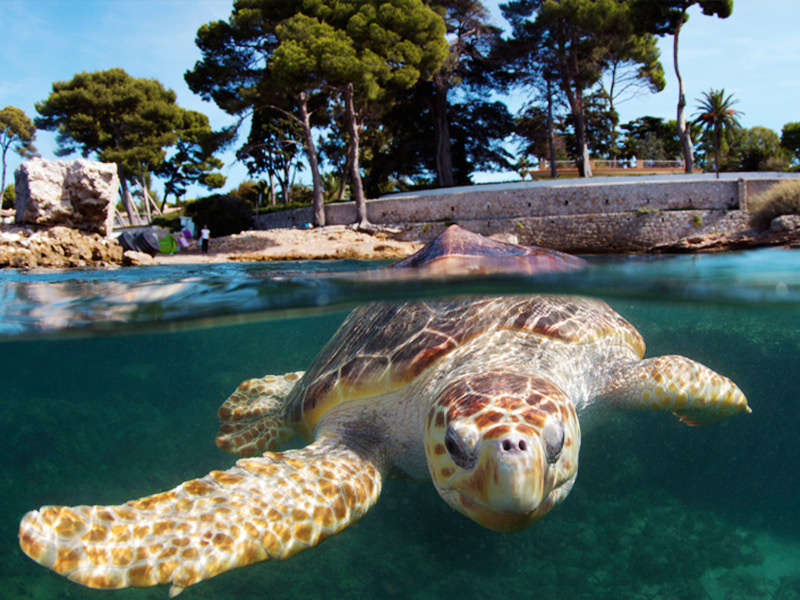Online tickets from
Our animal experts
The first duty of a modern zoo like Marineland is to ensure the good health and wellbeing of its animals through the expertise of its staff, animal keepers, aquarists, curators and veterinarians, as well as the quality of its facilities.
50 animal keepers and aquarists
At Marineland, 50 animal keepers, aquarists (marine animal keepers working in aquariums) and a veterinary team specialising in wildlife monitor the animals every day. The keepers care for the animals, prepare food and ensure proper nutrition, implement environmental enrichment programmes, clean the facilities and are trained to report on the behaviour of the animals in their care. They assist the veterinary teams with medical examinations, weighing, health monitoring and care when necessary.
These professionals have specific knowledge and skills for each species. Although this job allows to experience a close relationship with the animals, it is a very demanding task that requires a thorough understanding of the behavior of each species and individual animal. These skills and insights can only be acquired with time and experience. Keeping up with and respecting the ever-changing national and international animal standards also plays a part in Marineland's recognised expertise.


Expert "curators" and a specialised veterinary team
The curators are the people in charge of designing, implementing and controlling animal-related activities, approving educational content and supervising the zoo's animal teams. They are experts whose skills have been evaluated and recognised by a specialised panel through the award of a certificate of competence. This certificate, which is issued by the public authorities, is required for a facility open to the public to be authorised to display live animals belonging to local or foreign wildlife. At Marineland, 6 certificates cover the full range of species present: cetaceans, pinnipeds, marine turtles, seabirds, fish and invertebrates.
A veterinary area, with a laboratory and modern equipment, has been fully operational at Marineland since 2008. The veterinary team implements and supervises prevention and health monitoring protocols, and controls the hygiene and feeding of the animals. Each year, the veterinary team welcomes and supervises both veterinary and research students.
What does the job of animal keeper involve?
A keeper's role is often confused with that of a vet by the general public. Keepers take care of their animals, veterinarians treat them. The two professions are obviously very complementary.
The job of animal keeper is multi-faceted and each of these facets must be mastered. There is the animal side, of course, but also technical and manual skills, as well as behavioural evaluation, environmental enrichment and learning, and there is the educational component, as the keeper is often required to interact with visitors or even do educational presentations to raise visitors' awareness. It's a very demanding job. Of course, it requires a passion for animals, but not only that... patience, physical skills, a sense of teamwork and a high degree of geographical mobility are also essential qualities. In return, this unusual job allows professionals to experience unique moments with the animals.
Keepers are also responsible for the maintenance and hygiene of the animals' living quarters. They must ensure that they are functional but also clean. This involves monitoring the various structures that make up the facility, as well as cleaning it regularly.
The keepers receive deliveries of fish and manage the stock. They prepare and distribute food to the animals according to their nutritional needs. This information is provided by the veterinary team who know the diets of each species and individual animal according to age, sex and season. The animal care team will set the feeding frequency in coordination with the veterinarian and curator to ensure that it meets the animals' physiological needs and enrichment programme.
The keepers are the first line of caretakers with responsibility for the health and wellbeing of the animals; as such, they must be able to detect the slightest unusual behaviour on the part of an individual animal. When this happens, they alert the veterinary surgeon, who comes to evaluate the situation, prescribes examinations, the results of which will determine whether or not a specific follow-up or treatment is necessary.
For marine animal keepers working in aquariums, known as aquarists or aquarologists, activities include the care and feeding of the different species, maintenance of the facilities (pools, tanks, filtration systems, etc.), cleaning of tanks and windows, breeding and reproduction, data processing, etc.

-
HOW DO I BECOME AN ANIMAL KEEPER? OR AQUARIST?
There are two main paths to becoming an animal keeper at a zoological facility. The first is suitable for people who want to study for longer periods of time, opting for a university course geared towards biology or psychology disciplines.
Another option is to attend an animal keeper training centre. This route has the advantage of enabling students to enter the field more quickly thanks to numerous work placements in zoos and animal parks. They offer new recruits the opportunity to be trained quickly and to come into contact with real professionals who are passionate about their work and who will be able to assess their skills:
There are several routes to the job of animal keeper in zoological facilities.
- Either you like studies and opt for a university course in biology or psychology.
- Or you want to be in contact with animals more quickly, so you join a training course for animal keepers:
- by enrolling at a training centre (CFAA in Gramat, MFR in Carquefou, CFPPA in Vendôme);
- by following courses that are partly based on distance learning (IFSA, Cours Animalia, ACFI Conseil, Fauna formation, etc.).
For aquarists, scientific studies (e.g. aquaculture, biology degree) are necessary, usually complemented by an Aquariology course. Scuba diving experience is also very useful.
. - Either you like studies and opt for a university course in biology or psychology.
-
JOB DESCRIPTION
What does your job involve?
Ensuring the welfare of the animals under my care.
Sharing and raising awareness of my passion with the public.
Increasing awareness about protecting our environment, the marine world, etc.
What are your different tasks?
Care and feeding of the animals.
Training sessions.
Maintenance and supervision of the animals' living quarters (hygiene and safety).
Is your work more physical, manual or intellectual?
All three, this job requires skills that are:
Physical: carrying buckets, swimming, freediving.
Manual: creating enrichment items, maintenance and cleaning of living spaces.
Intellectual: ability to take in multiple pieces of information about the animal, its environment, etc., in order to offer the animal the right session at the right time. It is also necessary to know how to set up adapted learning techniques, to create different enrichment activities and exercises to ensure the animal's wellbeing.
What are the advantages and disadvantages?
Advantages: job with passion = contact with the animals and the bond between the animal and its keeper, constantly learning about the animals... and about yourself, pleasant/outdoor setting, challenging, rewarding work.
Disadvantages: shift work hours and holidays, physical constraints, emotional strain, salary...
What made you choose this job?
Out of a sense of vocation, passion, conviction and love for animals.
-
SKILLS
What are the qualities required for this job?
Patience, ability to work independently, teamwork, ability to challenge oneself, geographical mobility.
Do you need special physical skills?
Be a good swimmer, be in good physical condition and not have a bad back.
Do you need to be able to speak one or more foreign languages?
Yes, to communicate easily with other keepers (the teams are often multicultural), to communicate with the public, to read scientific publications (often written in English).
How many years of post-16 studies do I need?
It depends on the skills, motivation and the chosen course of study, but generally you should expect:
4 years if you attend an animal keeper training course (Bac+1);
3 years with IFSA (distance learning).
-
WORKING CONDITIONS
Where do you do your job?
Mostly outdoors near the pools, but also indoors (specialised kitchen for food preparation) and occasionally on the move in veterinary laboratories.
Do you work alone or as part of a team?
Always in a team for safety reasons and to avoid too exclusive an attachment between a keeper and "their" animal, and also in close partnership with the veterinarian, the keepers from other areas, the educational team and the technicians...
What are your working hours?
Varying and flexible according to the seasons, with an increased presence during school holidays, weekends, public holidays, etc.
Do you consider that you are properly paid?
This is a job of PASSION with a lot of competition to do it! Doing what you love on a daily basis is a source of wealth in itself. When responsibilities increase, so does the salary!
-
OUR ADVICE
What advice would you give to a young person who would like to go into this profession?
Persevere because many are called and few are chosen, protect yourself morally and physically and know how to take a step back.
Have a plan B (professionally speaking).
Discover the job of animal keeper in videos
https://www.youtube.com/channel/UC2rvk_PhHQQ-S0k1VIzYRvA
The Marineland marine zoo offers its visitors (optional paying activity) the "Dolphin Keeper Unique Experience" to spend 45 minutes discovering this extraordinary job.


